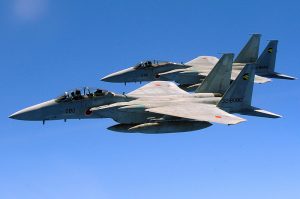In the wake of Russia’s attack on its sovereign neighbor, Ukraine, democratic nations must now accept the existential crisis that has been presented and acknowledge that World War II-style invasions, accompanied by modern information warfare, are now a reality in 21st century Europe. Russian President Vladimir Putin’s aggression and appetite for risk were never truly appreciated hitherto.
In response, previously unimaginable changes have taken place. Switzerland, Sweden, and Finland eschewed their longstanding neutrality and Germany announced it would increase its defense spending to 2 percent of GDP. Japan, for its part, has frozen Russian central bank assets, representing about 10 percent of Russia’s total currency reserves. But in the wake of thousands of deaths, more than a million refugees, and unprecedented levels of economic sanctions, the endgame is unclear.
When a permanent member of the U.N. Security Council can go rogue to such an extent, the most obvious response is collective self-defense. Sweden and Finland are reported to be considering joining NATO. Japan, which has territorial disputes with Russia, will need to reassess and further strengthen its security within the framework of the bilateral Japan-U.S. Security Treaty.
While the U.S. defense alliance enjoys broad support among the Japanese public, what is more opaque is the domestic perception of the invasion and how best to address this in a broader context. Since the end of the Pacific War, Japan’s emphasis has been on preventing the emergence of another militaristic regime from within. Article 9 of the Japanese Constitution states that, “Aspiring sincerely to an international peace based on justice and order, the Japanese people forever renounce war as a sovereign right of the nation.” Furthermore, the “threat or use of force as means of settling international disputes” is prohibited and, to this end, “land, sea, and air forces, as well as other war potential, will never be maintained.”
This text was well-suited to the purpose of Japan rejoining the international community after World War II. But in modern Japan, faith in Article 9 still endures with such intensity that it has turned those with liberal values into dogmatic textualists.
The debate in Japan about the use of force is acutely sensitive and has been reduced to black-and-white arguments that have left the Self-Defense Forces in limbo. In the absence of rational discourse, the resultant vacuum has been filled by bystander apathy and willful ignorance of the dangers the world faces. For example, following Russia’s invasion, Japan Communist Party leader Shii Kazuo took to Twitter in a widely shared self-serving tweet heralding Article 9 of the Japanese Constitution. And former Prime Minister Hatoyama Yukio alluded to fault on the sides of both Ukraine and Russia. Japan’s pacifists seem oblivious to the Ukrainians’ urgent need for military assistance.
Prime Minister Kishida Fumio’s rejection on February 28 of NATO-style nuclear-sharing with the United States pleased the public and was seen a rebuke of former Prime Minister Abe Shinzo. But such a policy is unnecessary, given the nuclear reach of the U.S. and the different premises of NATO’s constitution and the Japan-U.S. Security Treaty. The real question regarding Japan’s security has two elements. The first is the solidarity of Japan’s partners. India, one of four participants in the Quadrilateral Security Dialogue (the Quad), abstained on both U.N. General Assembly and Human Rights Council resolutions criticizing Russia, despite having urged other states to denounce the Russian aggression. This presents a dilemma in terms of future cooperation and further intelligence sharing in Asia.
The second element is a scenario in which the fundamental concept of collective self-defense is challenged. While such solidarity has not yet been tested, it was challenged during the Trump administration, when the president repeatedly complained about the nature of the security treaties with Japan and South Korea, as well as the U.S. relationship with NATO. John Bolton, Trump’s former national security adviser, is on record as saying, “In a second Trump term, I think he [Trump] may well have withdrawn from NATO, and I think Putin was waiting for that.” Japan can only hope that no future president entertains such dangerous isolationist whims.
The world is clearly a much more dangerous and less stable place than was imagined two weeks ago. And in the face of this new challenge, Japan needs to reconsider the nature of its contribution to peace. An innate distrust of anything military contributes little to national or global security. Sending a virtuous message of peace will, going forward, need to be accompanied by an effective hard power strategy within the continuing collective self-defense structure.













